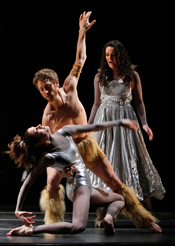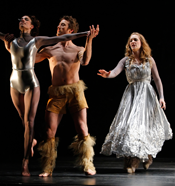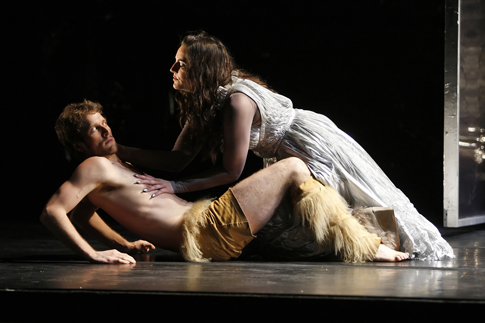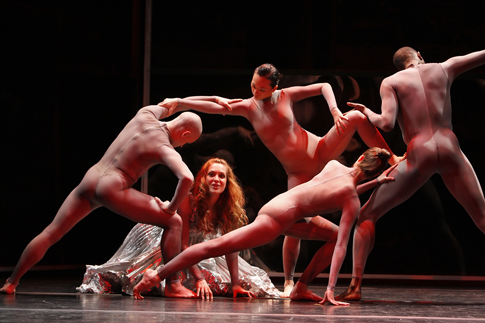
15 May 2008
Gotham Chamber Opera: Ariadne Unhinged
The Gotham Chamber Opera has been delighting opera fans on the Lower East Side for seven years now, one small audience at a time.
English Touring Opera are delighted to announce a season of lyric monodramas to tour nationally from October to December. The season features music for solo singer and piano by Argento, Britten, Tippett and Shostakovich with a bold and inventive approach to making opera during social distancing.
This tenth of ten Live from London concerts was in fact a recorded live performance from California. It was no less enjoyable for that, and it was also uplifting to learn that this wasn’t in fact the ‘last’ LfL event that we will be able to enjoy, courtesy of VOCES8 and their fellow vocal ensembles (more below …).
Ever since Wigmore Hall announced their superb series of autumn concerts, all streamed live and available free of charge, I’d been looking forward to this song recital by Ian Bostridge and Imogen Cooper.
Although Stile Antico’s programme article for their Live from London recital introduced their selection from the many treasures of the English Renaissance in the context of the theological debates and upheavals of the Tudor and Elizabethan years, their performance was more evocative of private chamber music than of public liturgy.
Evidently, face masks don’t stifle appreciative “Bravo!”s. And, reducing audience numbers doesn’t lower the volume of such acclamations. For, the audience at Wigmore Hall gave soprano Elizabeth Llewellyn and pianist Simon Lepper a greatly deserved warm reception and hearty response following this lunchtime recital of late-Romantic song.
For this week’s Live from London vocal recital we moved from the home of VOCES8, St Anne and St Agnes in the City of London, to Kings Place, where The Sixteen - who have been associate artists at the venue for some time - presented a programme of music and words bound together by the theme of ‘reflection’.
'Such is your divine Disposation that both you excellently understand, and royally entertaine the Exercise of Musicke.’
‘And there was war in heaven: Michael and his angels fought against the dragon; and the dragon fought and his angels, And prevailed not; neither was their place found any more in heaven … that old serpent … Satan, which deceiveth the whole world: he was cast out into the earth, and his angels were cast out with him.’
There was never any doubt that the fifth of the twelve Met Stars Live in Concert broadcasts was going to be a palpably intense and vivid event, as well as a musically stunning and theatrically enervating experience.
‘Love’ was the theme for this Live from London performance by Apollo5. Given the complexity and diversity of that human emotion, and Apollo5’s reputation for versatility and diverse repertoire, ranging from Renaissance choral music to jazz, from contemporary classical works to popular song, it was no surprise that their programme spanned 500 years and several musical styles.
The Academy of St Martin in the Fields have titled their autumn series of eight concerts - which are taking place at 5pm and 7.30pm on two Saturdays each month at their home venue in Trafalgar Square, and being filmed for streaming the following Thursday - ‘re:connect’.
The London Symphony Orchestra opened their Autumn 2020 season with a homage to Oliver Knussen, who died at the age of 66 in July 2018. The programme traced a national musical lineage through the twentieth century, from Britten to Knussen, on to Mark-Anthony Turnage, and entwining the LSO and Rattle too.
With the Live from London digital vocal festival entering the second half of the series, the festival’s host, VOCES8, returned to their home at St Annes and St Agnes in the City of London to present a sequence of ‘Choral Dances’ - vocal music inspired by dance, embracing diverse genres from the Renaissance madrigal to swing jazz.
Just a few unison string wriggles from the opening of Mozart’s overture to Le nozze di Figaro are enough to make any opera-lover perch on the edge of their seat, in excited anticipation of the drama in music to come, so there could be no other curtain-raiser for this Gala Concert at the Royal Opera House, the latest instalment from ‘their House’ to ‘our houses’.
"Before the ending of the day, creator of all things, we pray that, with your accustomed mercy, you may watch over us."
The doors at The Metropolitan Opera will not open to live audiences until 2021 at the earliest, and the likelihood of normal operatic life resuming in cities around the world looks but a distant dream at present. But, while we may not be invited from our homes into the opera house for some time yet, with its free daily screenings of past productions and its pay-per-view Met Stars Live in Concert series, the Met continues to bring opera into our homes.
Music-making at this year’s Grange Festival Opera may have fallen silent in June and July, but the country house and extensive grounds of The Grange provided an ideal setting for a weekend of twelve specially conceived ‘promenade’ performances encompassing music and dance.
There’s a “slide of harmony” and “all the bones leave your body at that moment and you collapse to the floor, it’s so extraordinary.”
“Music for a while, shall all your cares beguile.”
The hum of bees rising from myriad scented blooms; gentle strains of birdsong; the cheerful chatter of picnickers beside a still lake; decorous thwacks of leather on willow; song and music floating through the warm evening air.

The Gotham Chamber Opera has been delighting opera fans on the Lower East Side for seven years now, one small audience at a time.
Only 350 patrons can fit into the Henry Street Settlement Theater at 466 Grand Street, a circumstance which creates an intimacy between performers and audience that is unlike any experience you will have uptown. Brenda Patterson—the title character on the May 11 performance of the Chamber Opera’s most recent production Ariadne Unhinged—created electric moments in this little theatre.
Ariadne Unhinged is not an opera in the traditional sense of the word; rather, it is a collage of three pieces, only one of which was actually drawn from an opera. Claudio Monteverd’s Lamento d’Arianna (from the now-lost 1608 opera Arianna), Franz Josef Haydn’s cantata for solo voice Arianna a Naxos (1790), and Arnold Schoenberg’s melodrama Pierrot Lunaire (1912) were stitched together into a genre-busting performance by Neal Goren, Artistic Director of GCO, along with director and choreographer Karole Armitage of Armitage Gone! Dance.
 Frances Chiaverini, Ryan Kelly and Brenda Patterson (Ariadne)
Frances Chiaverini, Ryan Kelly and Brenda Patterson (Ariadne)
Ariadne Unhinged attempts to delve into the madness of grief that
the mythological Ariadne experiences upon being abandoned by her lover
Theseus right after she has saved his life and guaranteed him his crown. The
palindromic structure of the work nestled the three sections (of seven songs
each) of Pierrot Lunaire between sections of the Monteverdi and the
Haydn.
All the music was well performed and the juxtaposition of dancers and singer onstage, which can be so awkward if the singer doesn’t move well, was extraordinarily well executed. Vera Lutter’s set design, along with Clifton Taylor’s lighting allowed for a number of transformations of the stage without ever interfering with the action or the continuity of the work.
With sections Monteverdi serving as “bookends” and the middle piece of the performance, I was inclined to regard these moments of monody as Ariadne’s most lucid moments, while the Schoenberg represented her at her most mad and delusional. What struck me as detrimental to the endeavor was a series of less-than-subtle props carted onto the stage for each of the twenty-one Pierrot songs. The props—including huge cardboard roses, two-foot long knitting needles, a “grotesque” violin bow and a fake violin, and a cardboard moon on a stick, among others—appeared so predictably for each that I started wondering what the next prop might look like instead of listening to one of my favorite pieces of music.
 Emily Langford Johnson (Ariadne) and Ryan Kelly
Emily Langford Johnson (Ariadne) and Ryan Kelly
It seems to me that Schoenberg’s music and Albert Giraud’s poetry (as translated by Otto Erich Hartleben) is so vivid and full of meaning that the addition of wooden props is not only unnecessary, but even injurious to the artwork. In particular, when the dancers came on stage crouched under wrinkled aluminum sheets the effect was only the creation of a major distraction due to the sound of the sheets crinkling and crackling during the entire song. Other parts of the dance were much more effective and added greatly to the experience, notably, the lovely duets that were danced while Ms. Patterson sang the sections of Haydn’s cantata.
The GCO’s orchestra was another highlight of the evening—each composer’s music had a different accompaniment: theorbo for the Monteverdi, piano for the Haydn, and of course, Schoenberg’s Pierrot ensemble for Pierrot Lunaire. All the instrumental music was impeccable, but the Pierrot ensemble brought a particularly enjoyable energy to the performance.
 Brenda Patterson (Ariadne) and dancers
Brenda Patterson (Ariadne) and dancers
Goren’s little company is doing big things for opera, and I eagerly await its next production.
Megan Jenkins